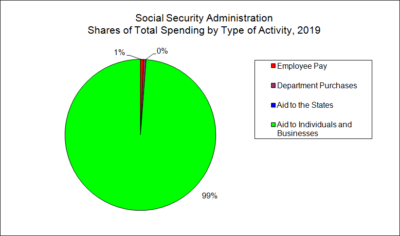The Social Security Administration runs Old-Age, Survivors, and Disability Insurance, which is the largest federal program. It also runs Supplemental Security Income. These programs are growing rapidly and are financially unsustainable without restructuring. Reforms should promote greater reliance on personal savings for periods of disability and retirement.
The Social Security Administration will spend $1 trillion in 2019, which is about $8,660 for every U.S. household. After adjusting for inflation, spending has increased 64 percent since 2000.
- Social Security Retirement. Social Security faces a huge financing gap because of its pay-as-you-go structure and the aging of the population. It should be transitioned to a system of personal savings accounts, which would increase financial security and help to avert future tax increases.
- Social Security Disability Insurance. Growing numbers of Americans are receiving disability benefits, and the system is subject to major abuses. Policymakers should tighten eligibility for the program and explore ways to move it to the private sector.
- Supplemental Security Income. This program for low-income and disabled individuals suffers from similar abuses as Disability Insurance. The financing and administration of Supplemental Security Income should be devolved to the states.
- Chris Edwards, Director, Tax Policy Studies
- José Piñera, Senior Fellow
- Michael Tanner, Senior Fellow
- Milton Friedman on Social Security, Hoover Digest, April 30, 1999.


